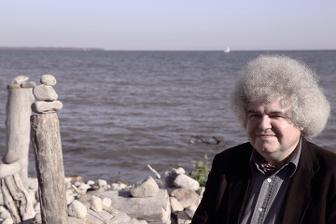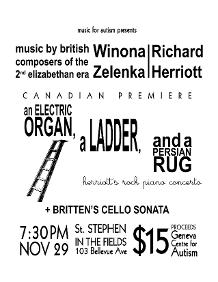

With the practiced stoicism of an accomplished magician, Richard Herriott sits down at the piano. An Electric Organ, a Ladder and a Persian Rug, the key components of the performing composer's acclaimed Rock Piano Concerto Without Orchestra are arranged for us to contemplate with the same degree of meticulous care Herriot may have used to orchestrate his attire before stepping into it. In spite of his muted facial expression, the accomplished concertist's predisposition for all things transcendental and electrifying is betrayed by his coiffure: a lofty halo of hair that has become his signature.
Given Herriott's sensibilities, it seems rather fitting that the upcoming showcase of his rollickin' virtuosity at plucking the ivories should make its Canadian premiere inside the warmly intimate St. Stephen's church. Situated on freewheeling Bellevue Ave., at the heart of Kensington Market's eclectic vista of cafés, craft stores and local designers, St. Stephen-in-the-fields stands as one of Toronto's beloved, unorthodox concert venues, and a prime destination for laid-back kicks.
Herriott premiered his Rock Piano Concerto Without Orchestra in the UK. When a video recording of his performance landed on YouTube, it drew close to 3,000 hits – in spite, one might add, of the popular video hub's failure to convey the feverish experience of seeing Herriott perform live.
Aside from his aptitude to magisterially 'hammer out' a piano repertoire that's been labeled as near-unplayable with the low-key expression of a Sunday morning jaywalker cutting across a sleepy tree-lined boulevard, Herriott is particularly adept at defying a prevailing culture of stuffy, spiritless playing. His personal instrumental brand of Brit-style progressive rock sails right through the classical/contemporary divide like a sailboat running with a motor.
Although the prolific pianist is known to parcel out his melodies in neat little mouthfuls of tongue-in-cheek humor, purists will be (somewhat) comforted to know that Herriot's artistry falls short of being irreverent. He confides, for instance, that when he performed the Rock Concerto in Ukraine, "the kids absolutely loved it". (But two piano teachers walked out in horror.) The anecdote aptly sets the tone for the type of divertimento we can expect tomorrow night. In the course of an interview for Whole Note magazine, Herriott advocated that readers who plan to attend "come prepared for a significantly less decorous and more exuberant ambience than that of the typical concert."
Indeed! Friday night's proceedings have been baptized as "Music of British Composers of the 2nd Elizabethan Era". The second piece around which the program is centered is Benjamin Britten's Cello Sonata. When the said Sonata premiered in London, England, in 1960, the performing cellist, Mstislav Rostropovich recounts that he and Britten were so nervous that they required "four or five very large whiskies" before performing what The Guardian dubbed a composition of "unbuttoned playfulness." Ultimately, though, the reason why spectators should expect a debonair atmosphere is the principle that inspired the concert series.
Herriott is the father of two autistic sons who reside in Leeds, England. When the youngest, Gregory, was six years old, he happened to walk into the music room while his father practiced the sophisticated Hindemith Oboe Sonata. The child sat down on a chair. As he rocked back and forth (as autistic children are prone to do), the boy proceeded to sing the extremely complex oboe part, in perfect tune to the piano. Herriott describes his oldest son, Oliver, as someone who can multiply very large integers with the kind of ease that we grownups can only aspire to imitate. With their classmates, Herriott's boys carry on freely: having discussions about complex mathematics that leave their parents completely baffled.
While his children receives state-of-the-art, government-funded care in the UK, Herriott has come to realize what a formidable discrepancy there is between the UK's and Canada's level of understanding and care for individuals affected by Asperger's syndrome. He therefore concluded that he needed to bring to Toronto the Music for Autism concert series he established in the UK with a fellow musician, a decade ago. The concerts are founded on the premise that many autistic people possess a deep understanding and a great appreciation for the most complex of melodic compositions.
It's in this idyllic ambiance of inclusivity and ethereal complexity that the evening at Saint Stephen-in-the-Fields is set to unfold. The exquisite chamber musician, Winona Zelenka – the assistant principal cellist of the Toronto Symphony Orchestra, no less – will be working her own breed of magic on the strings.